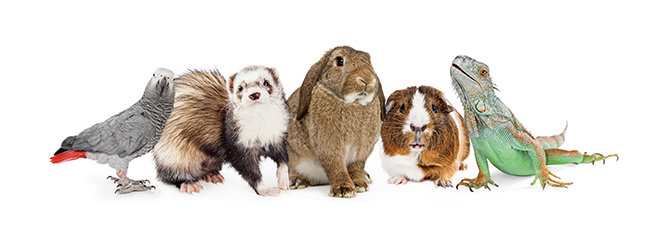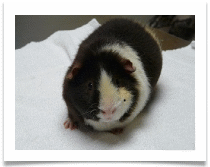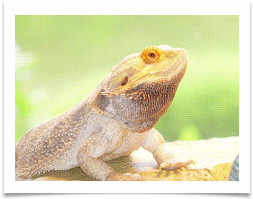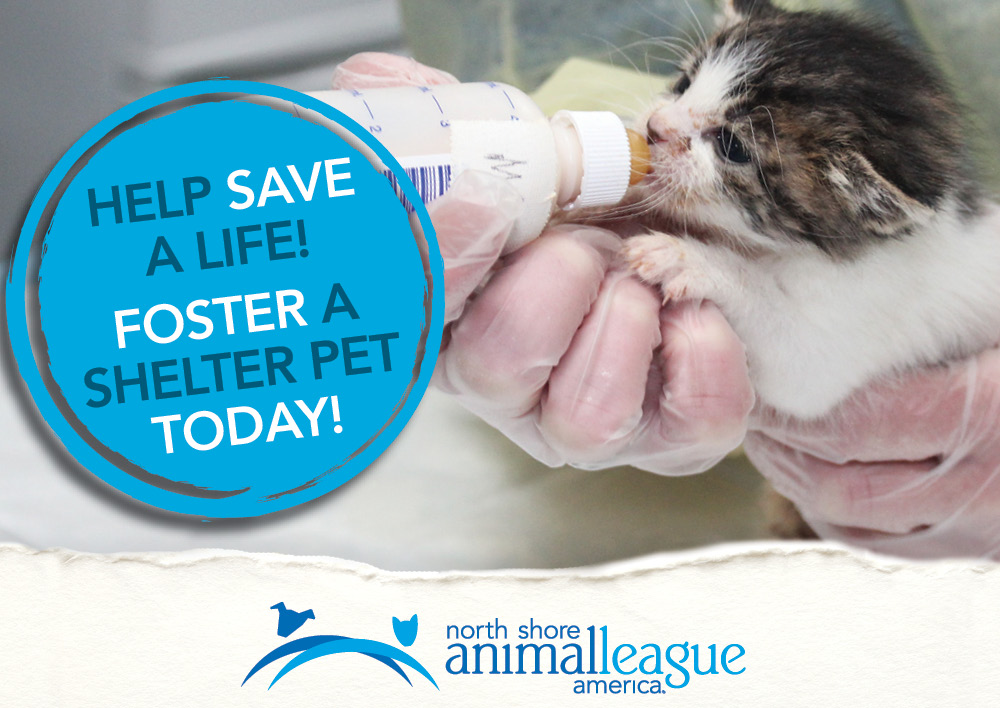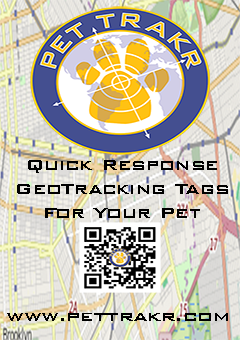Not Your Typical Vet or Pet
By Dr. Laurie Hess, DVM, Diplomate ABVP (Avian Practice)
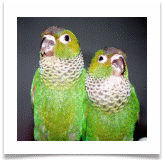
You'll
have to check her temperature every 15 minutes until it’s
normal,” said the veterinary nurse to me
in the surgical recovery room at the Animal Medical Center (AMC) in
New York City. I had to take the temperature of a 3-year-old female
pot-bellied pig that had just come out of intestinal surgery after
swallowing her owner’s gold hoop earring.
This was one of the first assignments I was given after starting my
5-week rotation on the Avian and Exotic Pet Service during my
one-year internship at the AMC. I was just three months out of
veterinary school, and I had never handled a pot-bellied pig (or a
ferret, hedgehog, gecko lizard, sugar glider, or many other exotic
pets) before. Yet, as a newly licensed veterinarian, I was expected
to know not only how to handle these pets, but also how to diagnose
and treat their illnesses. This rotation was my introduction to the
world of exotic animals – a world I came
to love so much that I decided to specialize in it.
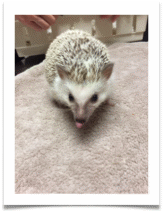
Growing
up in New York City, I had wanted to be a veterinarian since I was 15
years old. I grew up with animal-loving parents in a high-rise
apartment on the Upper East Side filled with pets
from
dogs and cats to guinea pigs, birds, and even a 150-gallon fish tank
containing a small shark and a sting ray. My parents tell me that
they knew I was destined to become a vet from the day a carriage
horse in Central Park bit me on the face when I was three years old
and rather that crying, I laughed. Once in veterinary school, I
planned to become a cat and dog internal medicine specialist. Yet,
everything changed when I began my exotic animal rotation at the AMC.
I realized, during this rotation, that these unique exotic pets were
as worthy of medical care as cats and dogs, yet most veterinary
students have little to no exposure to them in veterinary school. I
also realized that the only way to become truly knowledgeable about
these animals’
care was to continue my
education by staying on for a 2-year residency in avian and exotic
animal medicine and surgery that followed the internship. And so, I
did.
I spent two jam-packed years drawing blood, taking x-rays, and
performing surgery on all kinds of non-traditional pets. I learned
that exotic pet owners are as bonded to their animals as cat and dog
owners. I learned the importance of asking questions about diet,
housing, lighting, temperature, nutritional supplements, and social
interaction, as many of the problems that exotic pets develop are a
result of inappropriate husbandry. Too often, people become enchanted
with the notion of owning exotic pets and then purchase or adopt
these animals impulsively without learning anything about their care.
Consequently, many of these pets are not housed or fed appropriately,
and they subsequently become ill. I saw one animal after the next
suffering from life-threatening diseases as a result of their owners’
lack of knowledge about proper nutrition. Birds
with eggs stuck inside them from insufficient calcium consumption,
guinea pigs with joint disease from lack of vitamin C, rabbits with
life-threatening gastrointestinal stasis from too little dietary
fiber. How could dog and cat owners be so informed about vaccinating
and heartworm testing their pets, yet exotic pet owners be so
ignorant about their animals’
basic
nutritional needs?
My interest in exotic animal nutrition began during my residency when I
wrote my thesis on the nutritional requirements of pet parrots. I
learned how the high-fat seed and nut diets birds traditionally have
been fed contribute to many health problems, including
atherosclerosis, obesity, heart attacks, and strokes
just
as high-fat diets do in people. After publishing a ground-breaking
study on the importance of pelleted diets formulated to be
nutritionally complete for birds, I made it my mission to educate all
the exotic pet owners I met about how critical proper nutrition is to
the health and longevity of their animals. I now talk about the need
for proper nutrition every day at my exotic animal hospital, the
Veterinary Center for Birds & Exotics, in Westchester County, NY,
where I exclusively treat birds, ferrets, rabbits, rodents, reptiles,
amphibians, hedgehogs, sugar gliders, pot-bellied pigs, and other
exotic pets, as well as wildlife. It wasn’
t
until more than a dozen years after finishing my residency that I met
the folks at ZuPreem, an exotic pet food company that now
manufactures the most popular pelleted food for birds worldwide. I
immediately connected with the company’
s
philosophy about formulating specific products to solve nutritional
problems exotic pets face and am now helping them with their mission
(which has been my personal mission for years) to convert all pet
birds from high-fat seed diets to nutritionally complete and balanced
pellets. This year, ZuPreem became the first exotic pet food company
to support a study, which I pioneered, on the best methods to help
transition birds from seeds on to pellets. The findings of this
study, which involved nearly 200 veterinary clinics across the U.S.
and Canada that treat birds, will aid both veterinarians and bird
owners in easing this often difficult and frustrating transition,
especially for pet parrots that have been eating only seeds for
several decades. This study’
s results
will hopefully help educate both current and future bird owners about
what parrots need to eat to stay healthy and happy.
Thinking about adding an exotic pet to your family’s gift list?
Exotic pets can be great, but they’re not great for everyone. If you’re considering bringing an exotic pet – feathered, furry, or scaly – into your family, learn as much as you can about caring for this type of pet before you bring one home. Remember to:
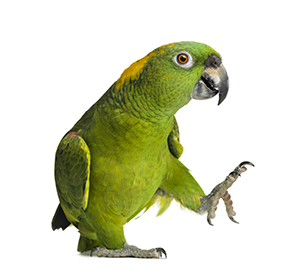
- Think before you act
Too many people see a colorful parrot, a cool reptile, or a cuddly pocket pet and think, “I just have to have one!” before they learn anything about what these pets eat, how much space they require, how they behave, and whether they are even legal in certain locales. Without proper knowledge of what these animals require, you might end up frustrated with a pet that’s not what you expected. Owner disappointment is the leading cause of why so many exotic pets end up in shelters. Talk to a veterinarian, breeder, or other individual knowledgeable about exotic pets before you bring one home.
- Involve the family
If you have family members in your household, consult with them to make sure everyone will welcome the new pet. If a family member is afraid reptiles or bothered by the noise of a squawking parrot, for example, you might want to think twice. Bring family members to the shelter or store from which you are getting the pet to be sure everyone is on board first.
- Make sure everyone will get along
Most exotic pets – even birds – can be integrated into homes that have dogs and cats. The key is to supervise all interactions and be sure you have adequate space to house pets in separate areas. Remember that cats, dogs, and ferrets are natural predators, while parrots, rabbits, rodents, and other small animals are prey species, so even the friendliest dog or cat should never be trusted alone with an exotic pet, even for a minute.
- Think long term
Unlike most dogs and cats, several exotic species (especially some of the larger parrots and certain reptiles) may live a very long time – up to several decades. So, if you are considering adopting one of these animals, think about who will care for this pet over the long term and whether you have the finances and time to do so.
- Have your new addition checked out
The first thing that most new dog and cat owners do after taking their pets home is to call their veterinarians to schedule a check-up. Unfortunately, most new exotic pet owners wait until their animals get sick to introduce them to the vet. Since many new exotic pet owners aren’t educated on the most up-to-date care for their animals, many new exotic pets are not cared for properly and end up becoming ill or behaving inappropriately. A trip to the veterinarian with a new exotic pet, regardless of species, can help avoid problems and promote a happier, healthier pet-owner relationship.
